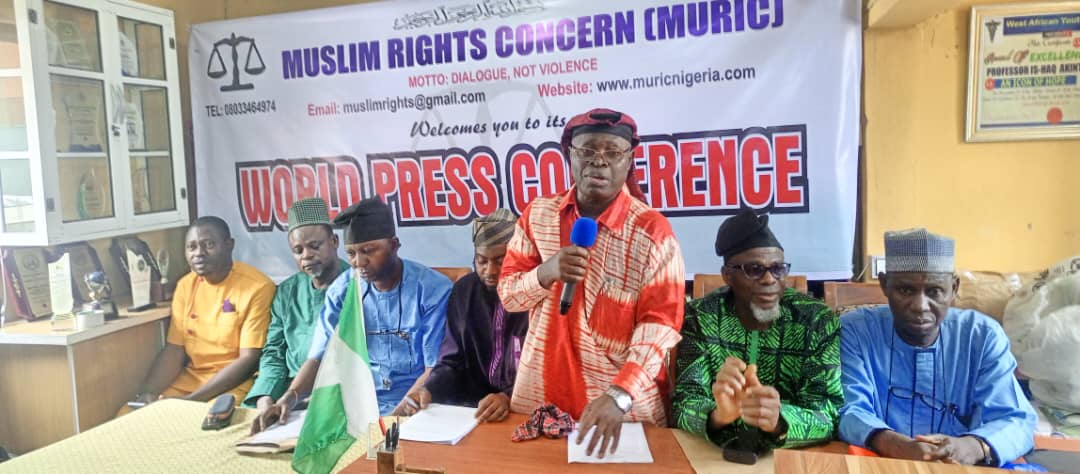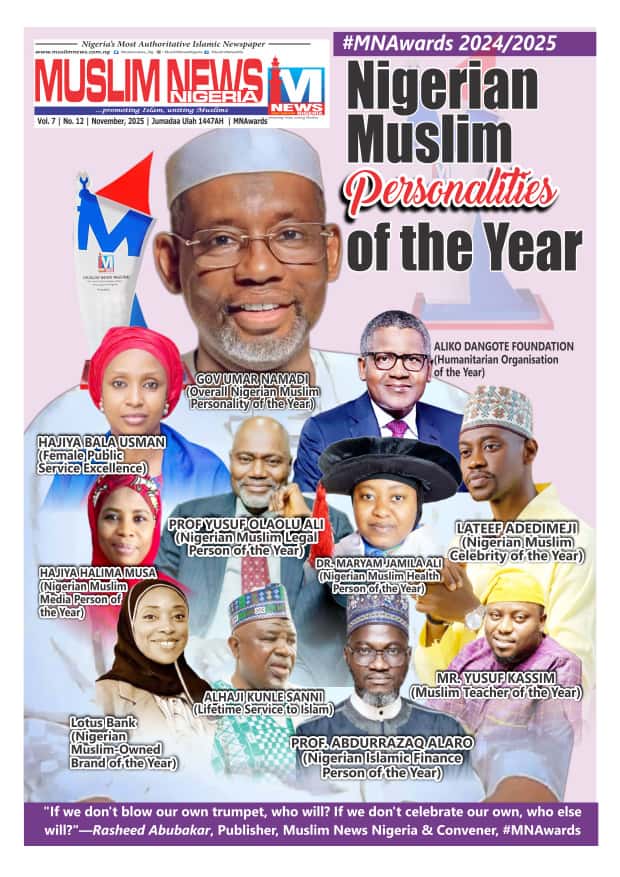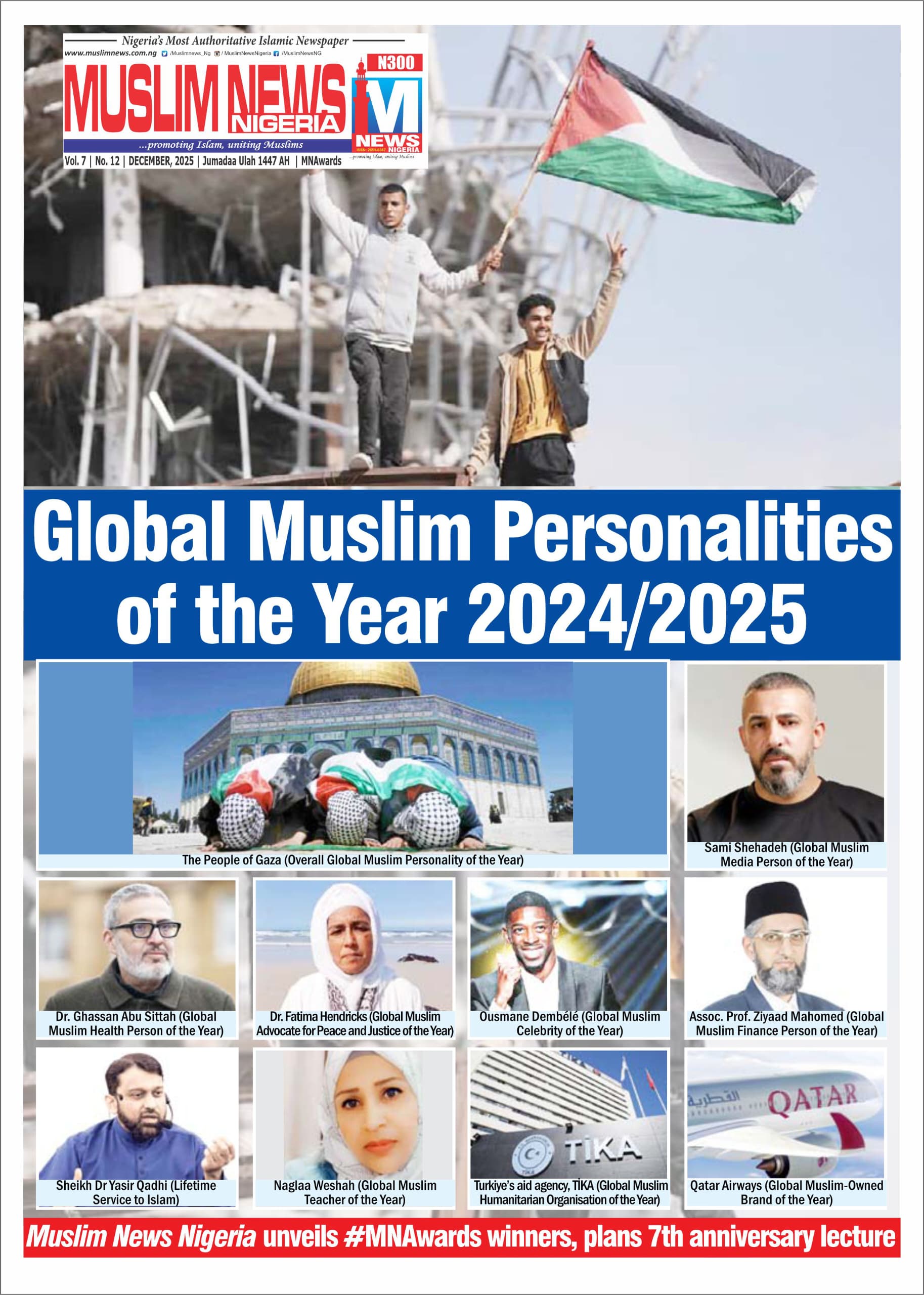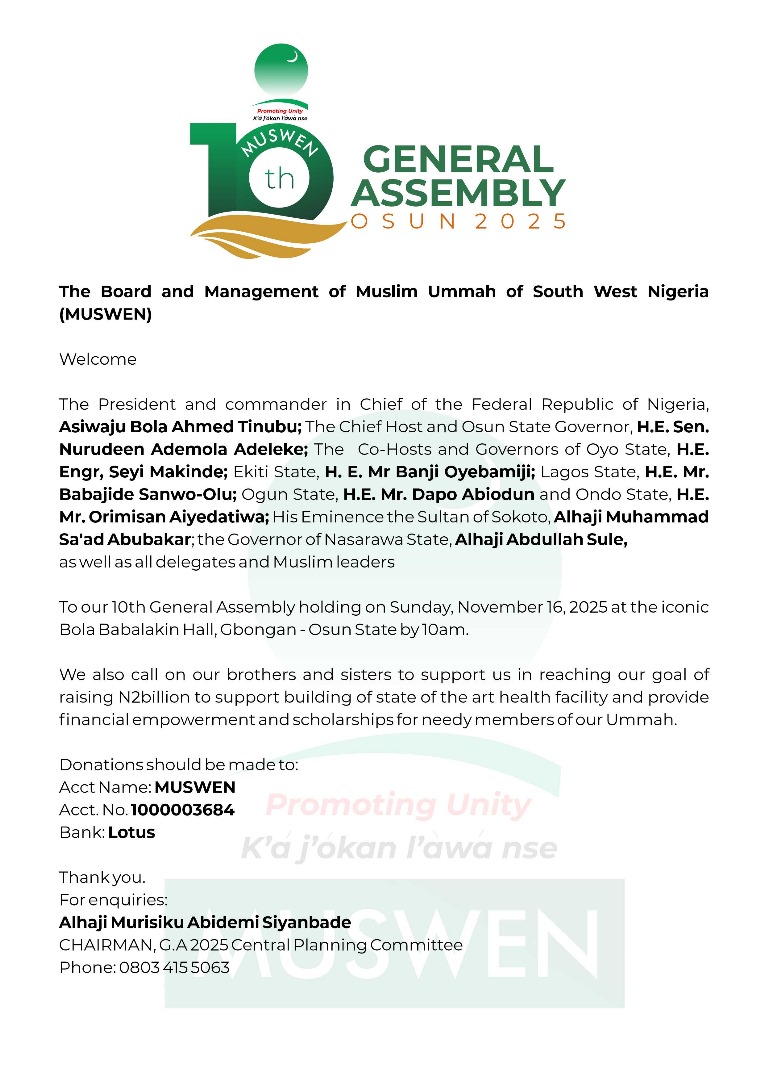* Lists political exclusion, hijab harassment, and denial of Islamic education as key concerns
* Worst persecution against Muslims happening under Seyi Makinde: MURIC Oyo
An Islamic human rights organisation, the Muslim Rights Concern (MURIC), has drawn the attention of the international community to what it described as the systematic and sustained persecution of Muslims in Nigeria’s Southwest region.
The group said its urgent intervention became necessary amid growing false narratives, including recent allegations of “Christian genocide” in Nigeria, a claim it dismissed as politically motivated and misleading.
It also asserted that the reality on the ground tells a different story, where Muslims in parts of Southern Nigeria face open marginalisation, institutional discrimination, and violations of their religious rights.
MURIC made this known during a world press conference held on Thursday, November 20, 2025, at its headquarters in Lagos.
Muslim News gathered that the high-level briefing, hosted by the Executive Director of MURIC, Professor Ishaq Lakin Akintola, attracted attendance from the chairmen of the organisation in five of the six Southwest states including Lagos, Oyo, Ondo, Ekiti, and Ogun, while Osun State was represented by delegates sent on behalf of its state chairman.
Decries systematic exclusion of Muslims in Ogun State
The Chairman of MURIC in Ogun State, Alhaji Tajudeen Jimoh, strongly condemned what he described as the “vicious and persistent” religious persecution of Muslims across parts of Southwest Nigeria, particularly in Ogun State.
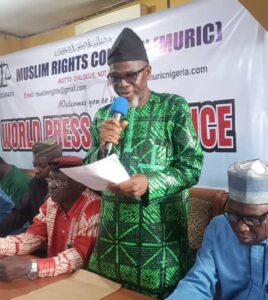
He accused the state government under Governor Dapo Abiodun, a Christian, of deliberately sidelining Muslims from meaningful political participation and leadership, describing the trend as “systemic and deliberate.”
Starting with the pattern of appointments in the State, he described it as “systemic and deliberate.”
According to him, since 1979, Ogun State has had five executive governors, of which only one has been Muslim. Presently, all key positions in the state, including Governor, Secretary to the State Government, Head of Service, Chief of Staff, Speaker of the House, and Chief Judge, are held by Christians.
At the local government level, Alhaji Jimoh revealed that 18 out of 20 council chairpersons are Christians, with the only two Muslims having no substantial influence.
“This is not just coincidental; it is calculated exclusion and structural injustice,” he stated.
The Ogun State Chairman of MURIC described the ongoing marginalisation as “structural persecution,” declaring, “Enough is enough.”
He stressed that the continuous sidelining of Muslims from key political and administrative roles in a state with a significant Muslim population is unjust and unsustainable.
Persecution in the education sector
The Muslim human rights group went further to highlight the disturbing trends of religious discrimination in the state’s education sector, describing it as a battleground for anti-Muslim hostility.
According to Alhaji Jimoh, female Muslim students face consistent harassment over their constitutional and religious right to wear the hijab in public schools.
“In many public schools, our daughters are compelled to remove their hijab. Teachers openly mock their Islamic identity and deny them entry into classrooms unless they compromise their modesty,” he noted.
The Chairman described these actions as “spiritual and emotional violence,” stating that the humiliation of Muslim girls for observing hijab is a direct attack on their dignity, identity, and faith.
Beyond dress code persecution, the MURIC also raised alarm over what it termed the “systematic marginalisation” of Islamic education in the government schools, accusing the state’s education system of undermining Islamic Religious Knowledge (IRK) and Arabic studies.
According to him, “Qualified IRK and Arabic teachers are being reassigned to teach irrelevant subjects. In some cases, Muslim students are outrightly denied access to Islamic instruction.”
The group described the situation as a “deliberate attempt to erase Islamic consciousness among future generations,” insisting that a state which prides itself on enlightenment cannot justify such exclusion and distortion of a major faith’s teachings.
Alhaji Jimoh called on the Ogun State Government and Ministry of Education to immediately address the injustices, ensure the protection of Muslim students’ rights, and integrate inclusive policies that respect religious diversity.
Employment bias and opportunity discrimination
Alhaji Jimoh, while briefing the media, accused the State Government of systemic exclusion of Muslims from employment opportunities across state ministries, departments, and agencies.
According to the group, recruitment exercises in the state are marred by bias and lack of transparency, with Muslims routinely sidelined.
“Christians dominate recruitment panels, interview boards, and final selection committees, and unsurprisingly, most of the final beneficiaries come from their religious constituency,” the statement noted.
MURIC described the trend as “institutionalised religious discrimination,” stating that such practices undermine meritocracy and alienate a large portion of the state’s population.
“This is not fairness. This is not inclusion. This is a systemic denial of equal opportunity to qualified Muslims who wish to serve their state,” the organisation added.
Alhaji Jimoh therefore called on the State government to take immediate and practical steps to ensure justice and fairness for the Muslim community.
He urged the state to guarantee fair and inclusive representation of Muslims in political appointments and governance structures, reflecting their population strength and contributions.
It also demanded an end to the harassment and persecution of Muslim students who wear the hijab in public schools, noting that their rights to religious expression must be protected.
“Stop the intimidation and misuse of Arabic and IRK teachers. Strengthen Islamic education at the primary and secondary levels. Guarantee equal employment opportunities for qualified Muslims. Address systemic discrimination within local government leadership structures. Let peace reign — but peace cannot and will never exist where injustice thrives,” he added.
The worst persecution against Muslims happening under Seyi Makinde: MURIC Oyo
In his own submission, the Secretary of MURIC in Oyo State, Ambassador Ibrahim Agunbiade, accused the administration of Governor Seyi Makinde of orchestrating the worst form of religious persecution against Muslims in the state’s history.
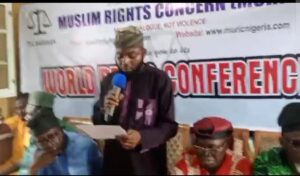
“We affirm that there has been a plethora of religious persecutions in several places and at different occasions in Oyo State under various regimes,” Agunbiade stated, adding, “but the worst of such religious victimisation is happening under the current administration of Governor Seyi Makinde.”
While highlighting the persistent acts of persecution against Muslims in Oyo State, Alhaji Ibrahim Agunbiade cited the unlawful restriction of the hijab in state-owned public missionary schools as a glaring example.
He revealed that some teachers in Oyo State government primary and secondary schools forcibly remove the hijabs of female Muslim students and, in some cases, seize them permanently.
“This matter almost escalated into a major crisis in Ibadan before MURIC intervened, following multiple complaints from parents whose daughters were being denied their right to wear the hijab in publicly funded institutions,” Agunbiade said.
The Secretary noted that although the state government acknowledged the issue and issued directives to address it, many school principals have defied those orders, and no enforcement has followed.
“This continued disobedience suggests official complicity,” he added.
MURIC Oyo State chapter also expressed strong concern over what it described as the consistent marginalisation of Muslims in key political appointments within the state.
Despite Muslims forming a majority of the population, and playing vital roles in the state’s economy and development, political appointments continue to reflect religious imbalance.
The group cited the current administration of Governor Seyi Makinde as an example. “Out of sixteen commissioners appointed, ten are Christians while only six are Muslims,” MURIC noted. “This lopsided distribution is unjust and unfair, especially in a state where Muslims contribute significantly to governance and growth.”
Alhaji Agunbiade also raised concerns over the marginalisation of Islamic education in Oyo State’s public schools. He explained that in line with the National Council on Education (NCE) directive, the Nigerian Education Research and Development Council (NERDC) had issued a circular mandating all public and private schools to teach Islamic Studies, Christian Religious Studies, and History.
According to him, the Oyo State Government initially complied and released a supporting circular on March 12, 2025. However, less than a month later, it reversed its position by issuing another directive that contradicted the national policy.
“As a result, only a few public schools now teach Islamic Studies,” Agunbiade said. “This deliberate policy reversal denies Muslim students access to learning about their faith. The aim is to produce half-baked Muslims who will be easy to manipulate and convert to Christianity.”
MURIC Oyo State further outlined other acts of systemic religious discrimination allegedly committed under Governor Seyi Makinde’s administration. One major concern is the lack of a single Shari’ah court in the state, despite repeated demands by Muslims for access to Islamic personal law, which is constitutionally guaranteed.
The group also condemned incidents where Muslim students were reportedly forced to sing Christmas carols in public schools, describing it as religious coercion. An example cited was an incident at St. Anne’s School, Molete, Ibadan, on December 12, 2022.
Additionally, MURIC decried the discrimination faced by Muslim students in nursing schools across Oyo State and alleged the deliberate “Christianisation” of the TESCOM recruitment examination in August 2022. According to the group, questions in the exam were drawn from biblical references to favour Christian applicants.
They also criticized the recurring practice by government officials and institutions of scheduling official functions, school exams, and meetings during Jumu’ah prayer times on Fridays, effectively preventing Muslims from observing one of their most important weekly religious obligations. MURIC described this as a clear violation of religious freedom as enshrined in Nigeria’s Constitution.
Lagos Muslims face systemic marginalisation despite majority status
The Lagos State Chapter of MURIC also drew the attention of the world press to what it describes as widespread persecution and marginalisation of Muslims in Lagos State, despite their sizable population and economic influence in the region.
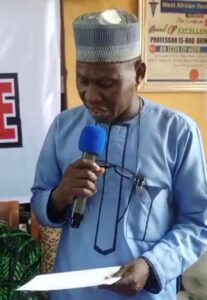
The Chairman of the Lagos chapter, Dr. Jamiu Busari, stated that Lagos is a cosmopolitan city-state with over 22 million inhabitants of diverse faiths, cultures, and nationalities.
According to him, it is the nation’s economic centre where Islam was embraced over four centuries ago with great impact till date. However, Muslims in Lagos have continued to face various forms of religious persecution, despite their overwhelming presence economically, administratively, educationally, socially, and politically.
Dr. Busari Muhammad highlighted the challenges Muslims in Lagos are grappling with, noting that these issues reflect the broader pattern of persecution faced by Muslims across other states in the Southwest.
He noted that despite Lagos being a Muslim-majority state with a deep Islamic heritage, Muslims continue to face systemic marginalisation. These include underrepresentation in political appointments, discriminatory practices in public sector employment and career progression, and persistent challenges in the education sector.
Dr. Busari cited hijab-related discrimination in schools, a critical shortage of Arabic and Islamic Studies teachers, and curriculum policies that disadvantage Muslim learners.
He also mentioned the lack of recognition for Muslim public observances and culture, unequal access to justice, and the total absence of Shari‘ah legal structures to serve Muslims seeking to resolve personal or civil matters according to their faith.
“These are structural issues that need urgent redress,” he said, calling on the Lagos State Government to take deliberate steps to correct the injustices.

